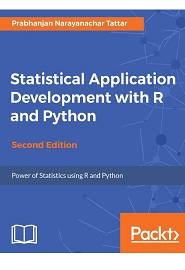
English | 2017 | ISBN: 9781788621199 | 432 Pages | PDF, EPUB, MOBI, AZW3 | 87 MB
Software Implementation Illustrated with R and Python
Statistical Analysis involves collecting and examining data to describe the nature of data that needs to be analyzed. It helps you explore the relation of data and build models to make better decisions.
This book explores statistical concepts along with R and Python, which are well integrated from the word go. Almost every concept has an R code going with it which exemplifies the strength of R and applications. The R code and programs have been further strengthened with equivalent Python programs. Thus, you will first understand the data characteristics, descriptive statistics and the exploratory attitude, which will give you firm footing of data analysis. Statistical inference will complete the technical footing of statistical methods. Regression, linear, logistic modeling, and CART, builds the essential toolkit. This will help you complete complex problems in the real world.
You will begin with a brief understanding of the nature of data and end with modern and advanced statistical models like CART. Every step is taken with DATA and R code, and further enhanced by Python.
The data analysis journey begins with exploratory analysis, which is more than simple, descriptive, data summaries. You will then apply linear regression modeling, and end with logistic regression, CART, and spatial statistics.
By the end of this book you will be able to apply your statistical learning in major domains at work or in your projects.
What You Will Learn
- Learn the nature of data through software with preliminary concepts right away in R
- Read data from various sources and export the R output to other software
- Perform effective data visualization with the nature of variables and rich alternative options
- Do exploratory data analysis for useful first sight understanding building up to the right attitude towards effective inference
- Learn statistical inference through simulation combining the classical inference and modern computational power
- Delve deep into regression models such as linear and logistic for continuous and discrete regressands for forming the fundamentals of modern statistics
- Introduce yourself to CART – a machine learning tool which is very useful when the data has an intrinsic nonlinearity
Resolve the captcha to access the links!